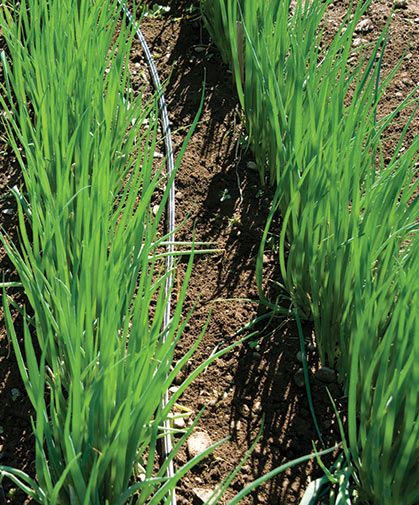Bunching Onions - Key Growing Information
SCIENTIFIC NAME:
Allium fistulosumCULTURE:
Seed can be sown in early spring for summer use, and in July or August for fall and spring use. Bunching onions prefer a soil with a pH of 6.2–6.8. Extra-hardy varieties will normally survive the winter if the soil is well drained.DAYS TO MATURITY: From direct seeding; subtract 10–15 days for days to maturity from transplant.TRANSPLANTING:
Sow 6–8 seeds per cell in 72-cell trays at the same time you would seed bulbing onions for transplant. Transplant seedling clusters 6–8" apart in rows 18" apart. For Negi-style scallions with a thicker blanched portion, start in flats. Then, beginning in late spring, when 8–18" tall and pencil-thick, transplant outdoors 6" apart, rows 24" apart in holes dibbled about 6" deep. Only 1–2" of leaves need extend above the soil surface. Do not firm soil — allow irrigation or rain to fill in the dibble hole.DIRECT SEEDING:
Sow ¼" apart in rows of 2–3" wide bands,¼–½" deep. Thin to about an inch apart only if large diameter is needed. Keep well cultivated so that plants receive maximum light.AVG. DIRECT SEEDING RATE:
1 oz./250', 4 oz./1,000', 1 lb./4,000', 7½ lb./acre at 50 seeds/ft. in 2" wide bands 18" apart.BLANCHING: During the growing period hill the plants with soil 2 or 3 times, higher with each hoeing. This forces the leaves higher up the plant resulting in extra-long blanched stalks and a much greater edible portion. When using the "dibble method", hilling is reduced or eliminated.HARVEST:
Loosen with fork or underminer and gather. Wash, hydrocool, and hold at near freezing until shipped or displayed.SEEDS/LB. (AVG.):
150,300.PACKET:
500 seeds, sows 10'.


